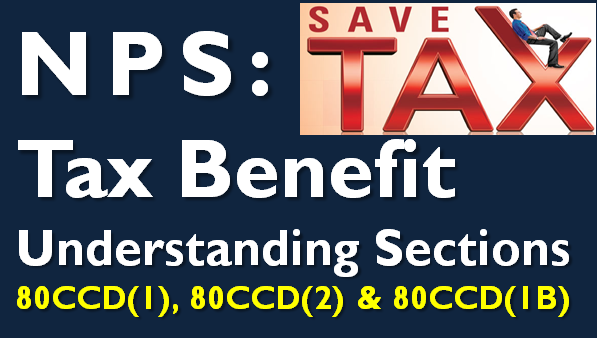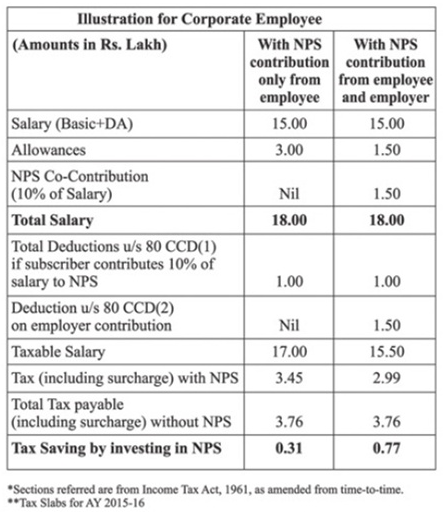In last few weeks I have got several mails and comments asking about the tax benefit on NPS. This post explains the tax deduction availa/ble for NPS under 3 sections: 80CCD(1), 80CCD(2) and 80CCD(1B).
Tax Benefit on NPS Tier 1 and/or 2?
NPS has two Tiers – 1 and 2.
NPS Tier 1 is the long term investment, which has restricted withdrawals and meant primarily for retirement planning. On maturity, you can withdraw maximum of 60% of corpus as lumpsum and rest has to be used for annuity purchase.
NPS Tier 2 is for managing short to medium term investment. You can invest and withdraw anytime as per your wish. This is an optional feature and you are asked if you need Tier 2 account while opening NPS.
All the tax benefit related to NPS is available to investment in NPS Tier 1 account only.
Also Read: When and How can Tax Benefits Claimed Earlier be Reversed?

NPS Tax Benefits:
NPS tax benefits are available through 3 sections – 80CCD(1), 80CCD(2) and 80CCD(1B). We discuss each below:
1. Section 80CCD(1)
Employee contribution up to 10% of basic salary and dearness allowance (DA) up to 1.5 lakh is eligible for tax deduction. [This contribution along with Sec 80C has 1.5 Lakh investment limit for tax deduction]. Self employed can also claim this tax benefit. However the limit is 10% of their annual income up to maximum of Rs 1.5 Lakhs.
2. Section 80CCD(1B)
Additional exemption up to Rs 50,000 in NPS is eligible for income tax deduction. This was introduced in Budget 2015.
Also Read: Should You invest in NPS to take tax benefit u/s 80CCD(1B)
3. Section 80CCD(2)
Employer’s contribution up to 10% of basic plus DA is eligible for deduction under this section above the Rs 1.5 lakh limit in Sec 80CCD(1). This is also beneficial for employer as it can claim tax benefit for its contribution by showing it as business expense in the profit and loss account. Self employed cannot claim this tax benefit.
Below is the illustration on how introducing NPS can help you save tax under Section 80CCD(2).

Tax Benefit for Compulsory NPS deduction:
The earlier pension structure was replaced by NPS in most central and state government jobs since 2004. So anyone who joined after that has compulsory deduction for NPS. The deduction is 10% of basic salary and dearness allowance (DA) and the employer too contributes the matching amount. The confusion for most employees is how they take tax benefit on their compulsory NPS deduction?
Here is an example:
Amit is a government employee and his employer deducts Rs 62,000 per annum (which is 10% of basic + DA) from salary as employee’s contribution in NPS. It also deposits Rs 62,000 per annum as employer’s contribution in NPS. How and under which section should he claim tax benefit on NPS?
Let’s take the easy part first. Employee’s contribution in NPS would be eligible for tax deduction u/s 80CCD(1).
The employee has a choice as to which section [80CCD(1) or 80CCD(1B)] he wants to show his contribution. Ideally he should show Rs 50,000 investment in NPS u/s 80CCD(1B). The tax deduction on rest Rs 12,000 can be claimed u/s 80CCD(1). The section 80CCD(1) along with Section 80C has investment limit eligible for tax deduction as Rs 1.5 lakhs. So he should make additional investment of Rs 1,38,000 in Section 80C to save maximum tax. In all he can save Rs 2 lakhs tax u/s 80C and 80CCD(1B).
I hope this would have cleared the confusion on how NPS helps you save tax.

Gd Morning Amit Ji
My contribution in NPS is Rs.63000/- and same Rs.63000/-is employer’s contribution. In addition to that investment in LIC and principal amount of housing loan is Rs.147000/-
Kindly advice how much dedication can i claim
U/S 80C, 80CCD (1B) and 80CCD (2).
sir,my contribution in nps 72000 & employer same contribute in my nps account then my question that the employer contribution of 72000 add my income. or not
Your employer contribution is not added to your income and hence tax free
Hi Amit Jir
My NPS contribution deducted from salary is 58000.I have LIC of Rs 51000 along with PPF of Rs 100000.
Now maximum how much amount ami i exempted from Income tax?
Waiting for your response eagely.
Thanks
Take LIC + PPF exemption u/s 80C for 1.5 lakhs & NPS contribution up to Rs 50K u/s 80CCD(1B) making total exemption to Rs 2 lakhs!
Sir
its clear that an PSU employee can not claim deduction under section CCD S (Employers contribution) and can claim only 10% of basic pay + DA under section CCD 1.
Please clarify if 10% contribution under CCE (as shown by employer in it register) can be claimed under under ccd (1B) (upto prescribed limit of 50000) or otherwise. I can shown exemptions upto 1.5 L in other heads eg tuition fee, ppf and other savings under sec 80c etc.
thanx and regards
Employer contribution cannot be shown in 80CCD(1B) your contribution can
I am enrolled in nps. employee and goverment share is rs 50000 separately . I have also ppf deposit in this year rs 150000. Someone is saying that if u want to take benefit of 80ccd 1b u have to invest in nps separately. If u invest additional amount upto 50000 in nps only than u can claim under section 80 ccd 1b otherwise not.
Is it ture?
There are conflicting views on this. If you want to play safe invest additional in NPS but we think that your contribution as employee should also qualify for for 80CCD(1B) deduction!
I AM WB STATE GOVT. EMPLOYEE. wb GOVT HAS NOT ACCEPTED nps STILL NOW. CAN I INVEST IN TIER I OF
npS FOR AVAILING BENEFIT U/S 80CCD (IB)
Yes you can invest in NPS Tier 1 to take tax benefit u/s 80CCD(1B)
A PERSON GET TOTAL INCOME RS. 945636/- IN WHICH EMPLOYER CONTRIBUTION 10% OF BASIC SALARY AND DA IS INCLUDED. HIS EMPLOYEE CONTRIBUTION IS 85966/- AND SAME IS EMPLOYER CONTRIBUTION PLEASE UPDATE ME WHAT ACTUAL REBATE OF THE PERSON
If the employer contribution is included in total income then deduct the same to get taxable income.
Sir same case here… Pls provide rule under which employer contribution deduct in total income
Sir, if gross salary is 670561.ulip investment u/s80c is 150000.nps amount u/s 80ccd1b 50000.now what is my net salary to pay tax. Is this below 5lac or above 5lac.If i get rebate of 5000 u/s 87A
Taxable amount = gross salary – 80C investment – 80CCD(1B) investment
In your case taxable amount = Rs 4,70,561 – So its below Rs 5 lakh and your would get 87A rebate for FY 2016-17!
Sir my NPS contribution is 47111 and my lic+gis contribution is 117400. Can I got rebate of rs.164511
Yes 1.5 lakhs u/s 80C and rest for NPS u/s 80CCD(1B)
Sir as I m a government employee joined in 2012.
But nps account is opened in March 2016, my regular contribution 45000, same management share
Arrear contribution 140000, same management share
That is total contribution 90000+280000
Now the question is how much I show in 80cc(2)
Or process of deduction under different sections
You need not worry about 80CCD(2) as that is not reflected in your income.
All your NPS contribution would be counted for FY 2016-17 only. So you can take tax deduction of 1.5 lakhs u/s 80CCD(1) which is part of 80C deduction and 50K u/s 80CCD(1B).
Sir How much I put in 80cc(2) ?
Only 10% of basic plus da of this year only.
Although management share is not more than 10% of basic plus da of respective year.In this way there is to much loss. Plz Help me…Is there any other calculation for nps arrear contribution.
Do not worry about 80CCD(2) as that amount is not reflected in Form 16. So its exempted from tax anyway
Sir I asking about section 80CCD(2)
Under which we deduct whole management share.But due to arrear of 3 years it is about 200000.
Doubt is that every year it was not more than 10% of basic +da
SIR,
My gross annual salary is 697754, as per the monthly salary slips where employers contribution is not mentioned. Rs 56620/- has been deducted from my salary as contribution to NPS. and the same amont has been contributed by the employer but is not mentioned in the salary slips. My other deductions are Rs 90000(PPF & LIC). What will be my taxable income and whether i can still claim deduction for employer contribution to NPS if the same is not added while calculating the gross annual salary???
You cannot claim employer contribution in NPS for any tax benefit. It just makes your overall salary tax efficient as the employer contribution up to 10% of your basic + DA is tax free!
if i have nps contribution of Rs.62,000/- and others u/s 80c is Rs.1,00,000/-, can i claim tax rebate of Rs.1,62,000/- total????
yes
My contribution in NPS tier I is 67000 (10% of salary), remaining amount in LIC and PPF = 150000. Can I contribute addtional amount of 50000 through net banking in NPS account for caliming under 80ccd (1B).
Yes you can do so
My saving Rs (95000 CPS + 30000 HBA interest + 500000 Tuition Fees) = 625000/- under sec 80c
I rebate of Rs 50000/- under sec 80CCD(1) and 80CCD(1B)
Sir,
I am govt. employee, In my case 67000 (i.e. 10% of salary) is deducted in NPS – tier 1 under head 80 C, other tax saving under this head is 83000 in LIC and PPF. So, my question is to avail tax benefit under 80 ccd (1B) of 50000 can we contribute additionally in NPS through net banking, so my total tax saving on 200000.
SIR,
my gross total income is 7,03,164( including NPS employee & employer contribution). I have 1,50,000 La under 80C. NPS Employer contribution-57160, Employee contribution-57160. What is my taxable income?
Your taxable income is
703164 – 150000 – 57160 – 57160 (if you have added employer contribution to your income then deduct employer contribution else NO).
Sir,
I have added employer contribution in my income. Under which sections and how i have to claim deductions?
You should not add employer contribution as its not shown in Form 16
Dhaara 80C,80CCC, aur 80CCD (1) ke antargat anshdaan aur adayegi ka kul yogfal,jiski adhiktam sima Rs.1,50,000/- tak nirdharit hai.parantu,vitiya varsh 2016-17 se sarkar/niyokta dwara pension yojna me anshdaan ke sambandh me dhaara 80CCD (2) ke tahat katauti Rs.1,50,000/- ke alawa milegi.
SIR, what is the meaning of above written sentences? Kya isme total Rs. 3,00,000 ka tax benefit milega??
Mere pas tuition fees 54000per annum,nps me per month 4000(48000/- in one year),lic premium 100,000/-hai.
Inhe kaise dikha skti hu?please help me.
You can get tax exemption in following manner:
Sec 80C – Tuition Fee + LIC Premium (1.5 lakhs limit)
Sec 80CCD(1B) – NPS contribution up to Rs 50,000 (you have invested Rs 48,000 so can invest Rs 2,000 more)
80CCD(2) should not concern salaried tax payers. Its more for self-employed non salaried tax payers!
Thanks. ????
Sir i am self employed.
With annual income 800000.
Not invested any where .
Please guide me what will be better invest ment for me.
You can invest in tax saving instruments u/s 80C to get tax exemption up to Rs 1.5 lakhs & Rs 50K in NPS u/s 80CCD(1B) – making total of Rs 2 lakhs tax deduction. We have small ebook for tax planning. Please download and go through it – will solve most of your queries!